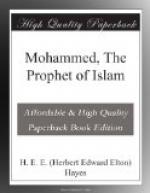During the raiding of the Jews, Mohammed was considerably disturbed by the desire of the wives to accompany him on the expeditions. He eased the difficulty by arranging that one only should go with him on each expedition, and should obtain the favour by lot. Ayesha got into difficulty on one of these expeditions. She dropped a necklace and remained behind the returning party in order to seek for it. A youth who, too, had loitered behind, found it, and accompanied her back to the camp. Her enemies were not slow to take advantage of this incident to prejudice her before the prophet. He was deeply hurt, and in face of the surge of public opinion, sent her back to her parents. The complications arising out of the divorce would probably have alienated the sympathies of Abu Bakr, her father, so with his usual diplomacy, Mohammed produced a revelation, in which God declared Ayesha innocent of any cause for divorce! It was through Ayesha, too, that the prophet conceived the idea of praying for deliverance from the torment of the grave, for she casually remarked one day that she had heard a Jewish woman speaking about torment after death. Through all her life with the prophet she proved herself to be strong in character, and a fitting mate for a man of Mohammed’s type.
Other wives did not play such an important part in the prophet’s life work. He seems to have exhibited his taste for beauty in all his selections. Keud was the daughter of a man of considerable wealth and influence, and, like Zainab, was one of the Abyssinian refugees. In the expedition against Khaibah, Mohammed’s greed was excited by the sight of some valuable ornaments belonging to one of his vanquished enemies. He sought to gain possession of them by marrying the daughter of the owner, Safiyyah, whose husband and brother had both been killed in the battle that had been fought. She accepted the prophet’s offer, and contented herself for her losses in the squabbles of his harem. His other wives were Juwairijah, Hafsah, Um Salmah, Um Kabibah, another of the Abyssinian refugees, and Zainab, widow of his cousin. The last wife was Maimunah, who is said to have offered herself to him when he was considering the invasion of Mecca. A Coptic (Christian) slave girl, Mary, and Rihanah, a Jewess, were added to the harem, but went through no form of marriage with him. Mary was sent as a present from one of the Coptic rulers in answer to the prophet’s letter, urging the claims of Islam; while Rihanah, whose husband was one of the many who were cruelly slaughtered by decapitation after a victory over the Jews, was at nightfall, almost immediately after the massacre, taken to the prophet’s tent. It is evident that the prophet had many opportunities of still further increasing his harem, for many women offered themselves; while the relatives of handsome widows would make no arrangements for the re-marriage of the bereaved ones until they had been offered to the prophet and refused.




